There are many ways to read comic books, and one of those that has become more common in recent years is on a computer. Peruse was created as a way to make exactly that as easy and pleasant as possible, and to simply get out of the way and let you read your comic books. One could say that it allows you to peruse your comic books at your leisure, but that would be a silly way of putting it - so, peruse your comic books at your leisure!
One of the ways in which Peruse ensures your reading experience is as pleasant and effortless as possible is to allow you to simply pick up where you last left off. The welcome page in the application (first screenshot below) shows you your most recently read comics, and shows your progress through them. To pick up where you left off, simply tap the top left item and you will be taken right to the page you were reading before you had to stop.
What formats does Peruse support?
Peruse Reader supports a wide range of formats:
- Comic Book Archive (cbz, cbr, cb7, cbt, cba)
With further support for embedded metadata in one of multiple formats: - Portable Document Format (pdf)
- ePub Books (epub)
- DeVice Independent files (dvi)
- DeJaVu (djvu)
- Compiled Help (chm)
Peruse Creator uses the Comic Book Archive Zip format with ACBF metadata for making new books.
More Than Reading
Peruse started out as a reading-only tool, but as we progressed with it, it turned out that having something to easily build new books would be very useful, and so was born Peruse Creator, a tool specifically designed to create books based around the Advanced Comic Book Format as stored in Comic Book Archive Zip files. As of Peruse 2.0, this tool is included as a part of the release.
There is also something for those who wish to use the ACBF format, without actually reading or creating books (maybe you're doing a command line tool for doing modifications or introspection of books, maybe you're reading metainfo for use in searching), and for that we have libacbf, a QtCore and C++ based library for managing ACBF data.
Why not Okular?
While KDE has had the enormously powerful Okular for quite a while now, the way in which it operates is geared directly towards viewing and commenting on large and small documents of so many different types that, well, it is simply too general purpose. The choice is also not quite so clear cut as "not Okular". The reason for this, however, is simple: When you are reading PDF files inside Peruse, you are in fact using Okular. As with many other things in Peruse, it functions by standing on the shoulders of the enormous talent and technological abilities available from the KDE community and its many frameworks, and Okular is one of those. As such, it is not a question of why not Okular, but more the point that it is also Peruse, for when your purpose is reading.
What does the future hold?
In the nature of software projects, a programmer's work is never done, and that is of course the case with Peruse as well. To see what's going on next, take a look at the Peruse Workboard and have a look at the listed tasks. If you think you've got an idea that we should consider that isn't already on that list, why not get in touch and tell us?
Screenshots
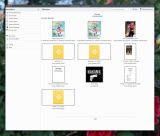
We welcome you to Peruse, so you can continue reading
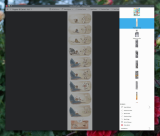
Reading a comic, the thumbnails shown with a hook gesture
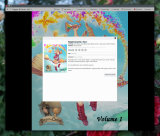
Looking at the book details trying to go back past the first page
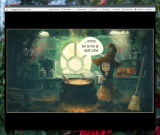
Navigating a book, frame by frame, and translated
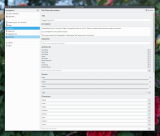
Creating a book, with lots of metadata
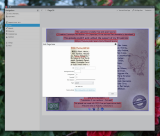
Add translated text on pages, and include links
Downloads
Source Code for version 2.0 Beta 1 (.tar.xz, 20/04/2021, 355KiB)
A tarball containing the source code for Peruse, for those who wish to build it themselves. To use this, you will need a number of further dependencies, but most importantly you will need CMake, which will then tell you what other bits you will need. How you get those will depend on your distribution.
Linux AppImage
If you would rather not install Peruse on your linux system (for example by using the OBS builds below), or your distribution is not provided for, you may want to have a look at this AppImage version. This image was built on Centos 6, which means that any system newer than that is supposed to be able to run it. If you encounter a linux system on which it does not run, please get in touch.
Peruse 1.2
Requirements:
- Arch specific: You must install the selinux package to be able to run this.
- A 64 bit Intel® architecture processor (we may be able to sort a 32bit build at some point, but for now, 64bit only).
- A reasonably modern Linux distribution (with selinux support).
- For an optimal experience, either a 2-in-1 device or other touch enabled laptop (or tablet).
64bit Linux Systems (27/12/2016, 70MiB)
Windows
Installer for the Peruse comic book reader application. Download this and run it. If Windows tells you it is unsafe or that you have been protected, click on the More Information option which will allow you to continue the installation.
Peruse 1.2
Requirements:
- A 32bit or 64 bit Intel® architecture processor, depending on your chosen download.
- Microsoft Windows Vista or higher.
- For an optimal experience, either a 2-in-1 device or other touch enabled laptop (or tablet).
64bit Windows Systems (27/12/2016, 42MiB)
Go »32bit Windows Systems (27/12/2016, 40MiB)
Open Build Service
A set of packages created using the Open Build Service, which allows for the creation of packages for a variety of targets.
Instructions for specific distributions
OBS will generate packages for various distributions, and we have used it to create packages for the ones below. While this is obviously a narrow subset, the packages may well work on other distributions as well (the xUbuntu packages, for example, will work on some other Ubuntu variants as well).
(Un)fold instructionsopenSuse Tumbleweed
To add this repository, either use the Yast Repository Manager, or use the command line by running the command in the fold-out...
zypper ar http://download.opensuse.org/repositories/home:/leinir:/peruse/openSUSE_Tumbleweed/home:leinir:peruse.repo
The package which contains Peruse is named, simply, peruse, and after adding the repository, you should be able to simply request that package from the package manager. From the command line this would be zypper install peruse, and in Yast you should be able to simply search for peruse.
Arch
Edit your /etc/pacman.conf file and add a new [section] for this repository. Point it at an appropriate mirror, as seen in the fold-out...
Pick one of the following (depending on your architecture):
and add the appropriate URLs to your pacman.conf, which you should be able to work out from the oter sections in there.
You will also need to add the signing key to pacman, so it knows how to use it. Follow the instructions in the Arch wiki to do so. The files you need are in the same location as the db files above.
xUbuntu 16.04 (and other Ubuntu variants)
To add this repository, go to this page and copy the address to whatever mirror is nearest you. Once you have done that, add a line to your /etc/apt/sources.list file like the one in the fold-out...
deb http://download.opensuse.org/repositories/home:/leinir:/peruse/xUbuntu_16.04 ./
where the url is the one you copied from the mirrors list page, with the /Packages part removed. Once you have done this, your normal apt-get commands will work just fine, and apt-get install peruse should result in you having a shiny, new comic book reader.
Alternatively, you can also use apt-add-repository to do the work for you. You still need to find that url as above, but you can then just issue the command sudo apt-add-repository http://..../whatnot (where the http://..../whatnot bit is the url as described above).
Finally, for all apt based systems, you need to download and add the signing key to your apt keychain. The file in question is Release.key, and you can find it behind this link. Once that is downloaded, run the command sudo apt-key add Release.key where you downloaded the file to, and you should now be able to get yourself a shiny, new install of Peruse.
Script-ish solution for Ubuntu variants
This is really the short version of the above, in a script-like format. You should still try and find a mirror link, but it should work without (it will just potentially be slower):
$ echo "deb http://download.opensuse.org/repositories/home:/leinir:/peruse/xUbuntu_16.04 ./ #Peruse" | sudo tee /etc/apt/sources.list.d/peruse.list
$ sudo wget --output-document - http://download.opensuse.org/repositories/home:/leinir:/peruse/xUbuntu_16.04/Release.key | sudo apt-key add -
$ sudo apt update
$ sudo apt install peruse
Source Code for version 1.2 (.tar.xz)
A tarball containing the source code for Peruse, for those who wish to build it themselves. To use this, you will need a number of further dependencies, but most importantly you will need CMake, which will then tell you what other bits you will need. How you get those will depend on your distribution.
External
Share.Krita.org Comics Section
The so far not enormously highly populated comic book section of Krita's content sharing site, which can be accessed from inside Peruse through the Get Hot New Books entry in the main menu. You can help build this for us, but please remember - as with all things Free and Open Source: Don't publish things that aren't legal.
Archive.org Comic Books and Graphic Novels
An enormous collection of comic books and graphic novels available for free download. A great many of these are available as cbz (Comic Book Zip) or cbr (Comic Book Rar) archives, which of course is supported by Peruse.
The KDE Website
Home of the KDE community. This functions as a central hub and welcoming page for the KDE web presence, and if you need information of any kind about KDE and its many projects, this is a good place to start.
Blue Systems
A company which sponsors work on a great many pieces of the KDE software stack, including Plasma and other frameworks. It also runs the NetRunner distribution. The goal of the company is to support the vision of technological liberation, which has now become an official cornerstone in the KDE mission.

 Made by KDE
Made by KDE